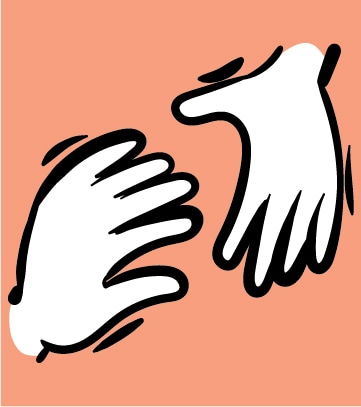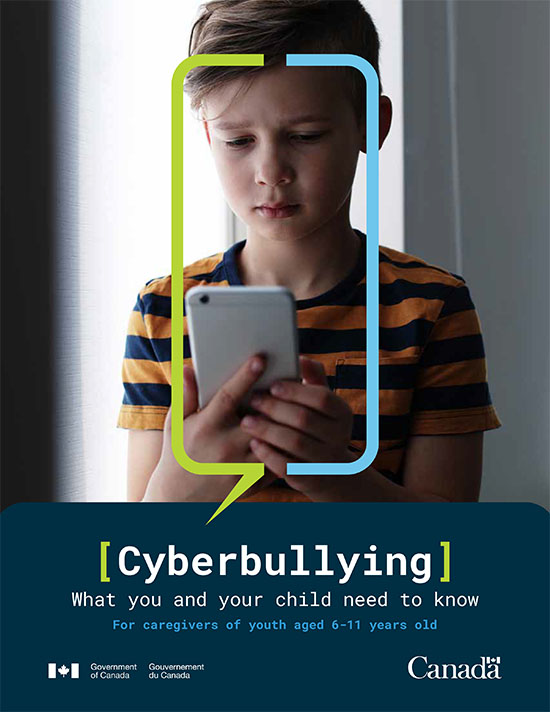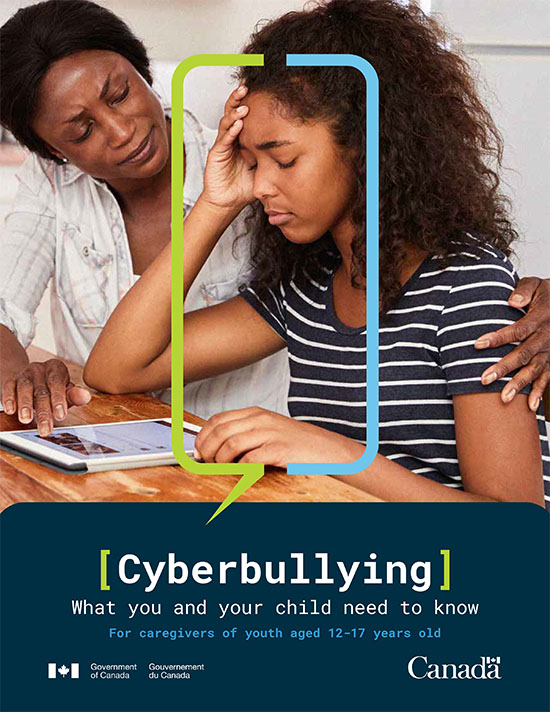Help protect your child from cyberbullying
From Public Safety Canada
Cyberbullying is serious — but it can be stopped.
Most youth spend a lot of time online. There is a good chance your child has witnessed, been the target of, or even cyberbullied themselves. There are actions you can take to prepare and protect your child in case it ever happens to them.
Cyberbullying comes in many forms
Cyberbullying can happen wherever youth interact online, including on social media, texts, chats, email, comment sections, apps, and online games. Because it happens through technology, cyberbullying tactics are constantly changing.
Here are some common forms of cyberbullying:
- Making fun of someone or how they look
- Sending mean, threatening, or harassing messages
- Spreading embarrassing or hurtful gossip, secrets, rumours, or lies
- Posting images, videos, stories, memes, jokes, or cartoons to embarrass, or humiliate someone
- Tricking someone into providing personal information and then sharing it
- Sharing intimate images or videos of someone without their knowledge or permission
- Excluding someone or ganging up on them
- Creating a poll that makes someone look bad
- Impersonating or logging in as someone and getting negative attention
- Screen capturing and sharing what was supposed to be private or temporary
What you can do to help prevent cyberbullying
Talk with your child about cyberbullying
Have a discussion with your child about cyberbullying. This will show them you think it is an important issue – and they will feel more comfortable coming to you if necessary. Here are some tips:
- Let them know you are aware of the issue. You can mention recent stories in the news or social media and how it seems like an important issue for teens.
- Ask your child if they have experienced or witnessed any kind of cyberbullying and let them tell you about it.
- Listen to what they have to say. Make it a conversation, not an interrogation.
- Let your child know they can always come to you and that you won’t overreact – even if they have made a mistake. Your child may be reluctant to tell you if they have posted or shared something they shouldn’t have because they think they will get in trouble.
- Encourage your child to talk with you if they ever witness someone being cyberbullied.
- Encourage them to come to you if they ever become a target of bullying themselves. Assure them your only concern is to keep them safe, and that you won't make the situation worse by ‘freaking out' or taking away their devices.
Be aware of what your child does online
It is important to stay informed about how your child spends their time online. These tips will help you keep them safe:
- Learn what sites your child uses and what accounts they have. Talk with them about what they do online, and who they do it with.
- Keep up to date with the technology. Learn about the connected devices your child is using, which apps and sites they use, and how they use them all.
- Try it yourself. Set up a social media profile, make posts and share content, play some of their games. You will have a better understanding of what your child is doing and how to talk with them about it.
Set ground rules for your child's online activity
Setting some simple ground rules with your child can help keep them safe online. Here are some tips:
- Insist your child use privacy settings. Make sure your child knows how to use the privacy settings and how to restrict who sees the messages, images or videos they post on social media sites and apps.
- Let your child know you may take action if there's reason for concern. Explain it is part of your job to keep them safe, and if you feel there's a risk, you may monitor their online communication.
- Encourage your child to create different strong passwords for each site and to never share their passwords with friends.
- Make sure they use a password to lock their devices. This will protect them if their mobile device – and what's on it – ever gets into the wrong hands.
- Ask younger children to give you the passwords they use. Let them know you will only ever use them in an emergency. Teenagers are more likely to see this as an invasion of their privacy.
- Help them remove posts, images or videos that they want to take down, and talk about what kind of things are okay and not okay to post.
Teach your child safe online behaviour
Youth connect and engage with their friends online. This is important, but it is not without risks. Here are some things you should help your child understand:
- Once something is posted online, it doesn't go away and it is possible to lose control over it. It can be shared and even altered by others. Even deleting something doesn't necessarily remove it from the Internet.
- It is fun to share photos and ideas, but your child should be careful what and where they post. Take a moment to consider who is going to see it and how others might feel about it.
- Your child should not publicly share personal information online. That includes where they are or will be, the name of their school, their phone number or email address, usernames or passwords, photos and videos they wouldn’t want strangers or anyone else to see.
- Not everyone online is who they say they are and some people may want to harm them. Encourage your child not to accept friend requests from strangers.
- They should treat everyone with respect and avoid saying things online they wouldn't say to someone's face. Do not say mean things, make fun of others, share secrets, gossip or lies, exclude or gang up on someone.
- Your child should not share naked images or videos of themself or others online. They should always be careful who they trust because they cannot control what other people do.
Take action to stop cyberbullying
Your child is being cyberbullied
Support your child by learning the warning signs, keeping lines of communication open, and being ready to take action.
You think your child is a cyberbully
Take steps to address your child's actions by talking with them, monitoring their online behaviour, and ensuring they understand the seriousness of cyberbullying.
Video
An animated video (that you can show your kids) that introduces the topic of online reputation and gives high-level advice.
Transcript
Whether you're doing homework, chatting with friends, or playing games, you probably spend a lot of time online. And just like when you're face to face with others, the things you say and do online can affect your reputation.
When you do or say things online that are hurtful, like leaving mean comments, sharing someone's sexual images, or cyberbullying someone, you can damage your online reputation, which can affect how people see you and treat you. It can give others a negative impression of you, and it might affect your relationships and friendships. It can also hurt others.
There are lots of ways you can protect your online reputation. Use privacy settings, limit access to your posts to friends, and think twice before you post: if what you're doing or saying can hurt someone, just don't post it.
Remember, what you post online can be seen by anyone—friends, family, teachers, and employers—it can stay online forever. If you're worried about your online behaviour, or if someone else's actions online are upsetting you, you are not alone. Talk to a safe adult or visit KidsHelpPhone.ca.
[Onscreen: Learn more at Canada.ca/Cyberbullying]
Booklets
Booklet for teachers and parents of kids aged 6-11
Find additional information in this booklet for parents/caregivers of kids aged 6-11
Booklet for teachers and parents of kids aged 12-17
Find additional information in this booklet for parents/caregivers of kids aged 12-17




